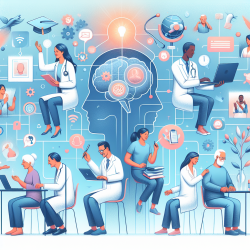Unlocking Potential: Improving Genetic Counseling Skills with Global Insights
In a world where genetic counseling is rapidly expanding, understanding the global landscape is essential for practitioners aiming to enhance their skills and deliver better outcomes. The research article, The Global State of the Genetic Counseling Profession, provides a comprehensive overview of the profession's status across various countries. This blog explores how practitioners can leverage these insights to improve their practice.
Understanding the Global Landscape
The profession of genetic counseling has grown significantly since its inception in the United States in 1969. Today, it is a well-established field in over 28 countries, with approximately 7,000 genetic counselors worldwide. This growth is driven by the increasing demand for genetic services across medical specialties such as oncology, pediatrics, and neurology.
Understanding the global landscape of genetic counseling can provide valuable insights into different training models, regulatory frameworks, and practice standards. For instance, the United States and Canada have robust training programs and certification processes, while countries like Cuba and Israel have unique approaches tailored to their healthcare systems.
Implementing Global Insights
Practitioners can enhance their skills by adopting best practices from around the world. Here are some strategies to consider:
- Continuous Education: Engage in ongoing education and training to stay updated with the latest advancements in genetic counseling. Consider international conferences and workshops to gain diverse perspectives.
- Networking: Build connections with genetic counselors globally through professional organizations such as the Transnational Alliance of Genetic Counseling (TAGC) and the National Society of Genetic Counselors (NSGC). These networks provide opportunities for collaboration and knowledge exchange.
- Adapting Best Practices: Analyze different training and practice models to identify best practices that can be adapted to your local context. For example, the UK's integration of genetic counseling into the National Health Service offers a model for integrating genetic services into existing healthcare systems.
- Advocacy and Policy Development: Engage in advocacy efforts to promote the recognition and regulation of genetic counseling as a distinct profession. This can lead to improved standards and increased access to genetic services.
Encouraging Further Research
The global state of genetic counseling presents numerous opportunities for further research. Practitioners are encouraged to explore areas such as:
- Comparative Studies: Conduct comparative studies to evaluate the effectiveness of different training models and practice standards across countries.
- Impact of Regulation: Investigate the impact of regulatory frameworks on the quality and accessibility of genetic counseling services.
- Technological Integration: Explore the role of technology in enhancing genetic counseling services, particularly in remote and underserved areas.
Conclusion
By leveraging global insights and engaging in continuous learning, genetic counselors can enhance their skills and contribute to the profession's growth. The global state of genetic counseling offers a wealth of knowledge and opportunities for practitioners to explore and implement in their practice.
To read the original research paper, please follow this link: The Global State of the Genetic Counseling Profession.










